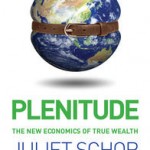by Juliet Schor
Juliet Schor is an Professor of Sociology with a background in economics.
She has deep expertise in the subjects of working time, leisure and consumerism.
In this book she advocates that we should breakout of the work hard / spend hard cycle and find new ways of living that not only make sense on a personal level but are also more sustainable and better for the planet. Schor argues that we can in fact achiever a superior lifestyle through clever application of technology and by a more DIY culture.
We should moderate our hours of work and make trade-offs of income for time. We should use our free time to spend it on activities such as household food cultivation, home construction and renovation, and community initiatives such as barter and bulk buying. Also to replenish the human connections that many of us seem to have lost.
We should diversify from the business as usual [BAU] market and “self provision” or make, grow or do things for oneself.
Schor notes the less one has to buy, less one is required to earn. She suggests that new agriculture knowledge and the invention of small scale smart machines makes it possible to turn household provisioning into a high productivity – and economically viable – use of our time.
“True materialism” an environmentally aware approach to consumption. Schor is not arguing that consumption is less important, indeed she argues that the plenitude consumer is likely passionate about consuming, and deliberate in the creation of a rich, materially bountiful life. Schor argues that living sustainably does mean we can’t reproduce a lifestyle of gas guzzlers, expensive square footage per person, bottled water and outsized paper consumption. But it does’nt mean we can’t have fabulous clothes, low impact electronic gadgetry, great local food and a more leisurely mode of travel.
The need to restore investments in one another and our communities. Interpersonal flows of money, goods and labor are a parallel system of exchange and savings. Schor argues that our intense consumer orientation of the last 20 plus years means that our community has gotten thinner and human ties weaker.
For 2010 to 2020 Schor predicts that market returns will be lower [given that many of the gains were illusory] and that the BAU (Business as usual) economy is in for a long slide.
She provides telling statistics about the massive growth in consumerism funded by decreased prices for furniture and household goods and apparel.
She notes that since 1990 in the United States, inflation adjusted per person expenditures have risen 300% for furniture and household goods, 80% for apparel and 15 to 20% for vehicles, housing and food.
Overall, average real per person spending increased 42%. She argues that much of this has been symbolic consumption, wants not needs.
I must say that I am with Schor on this one. Our debt-funded consumerism based economy is now bust. I sense that we will not be returning to a BAU economy. There are important shifts in power / emphasis between the Western economies and the Emerging economies. This, in conjunction with global warming pressures, energy pressures and the existing high levels of debt at State, Federal and household levels combines to suggest that we are entering into new territory here. I don’t think anybody has necessarily figured out where this is all headed but I think that Schor is right in that this doesn’t mean an inferior consumerism, just a different consumerism. Maybe we buy fewer items but they are more expensive, of a higher quality and “repairable, rather than “ditchable”. Interestingly a number of shoe companies are now releasing products that fit this idea.
Schor outlines what I thought was a fairly well known position on environmental issues, without much new for me in that section.
In the balance of the book Schor argues that we need to make clever use of technology and smart design to reduce our environmental impact, and also to improve our lifestyles.
Schor argues that we really need to pay more attention to our time allocation and spend less hours in paid labor and more time in home production, leisure and socialising. In this she outlines many of the sorts of issues that were well addressed in the book Affluenza.
So some of the key concepts are urban farming, permaculture, high tech DIY.
In fact Schor suggests that you should pay more, not less attention to your consumer self.
The book outlines patterns for sustainable consumption which in many ways are a throwback to old fashioned values of multifunction products and with extended product life.
She outlines the concepts of sharing that is the basis of the book Collaborative Consumption, e.g. Bike Share schemes, peer-to-peer lending etc.
I thought that this book is a useful contribution to the discussion on consumerism, happiness and sustainability. Schor presents a good case for change and outlines some interesting ways forward. I recommend this book to anyone who is in the process of forming their own philosophies in these subject areas.
More info : Juliet Schor’s Website

Comments are closed.